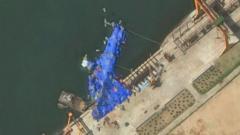North Korea's leadership has taken drastic action following a failed warship launch, arresting senior officials including the deputy director of the Munitions Industry Department as Pyongyang strives to maintain military credibility.
North Korea Targets Officials After Warship Launch Disaster

North Korea Targets Officials After Warship Launch Disaster
State media indicts multiple officials as Kim Jong Un expresses outrage over failed military vessel launch.
In a shocking turn of events, North Korea has arrested a senior official amid growing outrage from leader Kim Jong Un over a failed warship launch that has been characterized as a significant embarrassment for the nation. Ri Hyong-son, the deputy director of the ruling Workers' Party's Munitions Industry Department, was captured due to being deemed "largely responsible" for the incident, which resulted in the mishap of a new 5,000-ton destroyer last week.
The state-run Korean Central News Agency (KCNA) reported on Monday that the destroyer tipped over during its launch, causing severe damage to its hull. Kim has publicly condemned the disaster as a "criminal act" that has "severely damaged the [country's] dignity and pride." Repair efforts are currently underway, overseen by a designated team of experts, as the regime braces for possible repercussions.
Mr. Ri's arrest marks the highest-ranking official detained so far in connection with the failure. Over the weekend, three more officials involved in the ship's construction at the Chongjin shipyard were also taken into custody; these included the chief engineer, construction head, and an administrative manager, spotlighting the regime’s uncommon approach to addressing public failures.
Kim had criticized the incident for being a result of "absolute carelessness, irresponsibility, and unscientific empiricism." The implications of punishment remain uncertain, but North Korea is notorious for its draconian measures, including forced labor and even execution for those deemed culpable.
Interestingly, public acknowledgment of such mishaps is rare in North Korea’s tightly controlled media landscape, adding weight to analysts’ suggestions that Kim's rapid response may denote stronger resolve to continue enhancing military capabilities. Chun In-bum, a former commander of South Korea's special forces, interprets the state's candid reporting as a potential signal of confidence amid the authoritarian governance.
Kim's reaction is perceived as indicative of the high priority placed on naval advancements, particularly following the recent unveiling of a similar warship that Kim touted as a breakthrough for North Korea's maritime modernization, with plans for deployment looming in the near future. Michael Madden, a North Korea specialist, posited that the mishap may stem from overwhelming internal pressure on personnel, reflecting a rigorous drive for military progress.



















